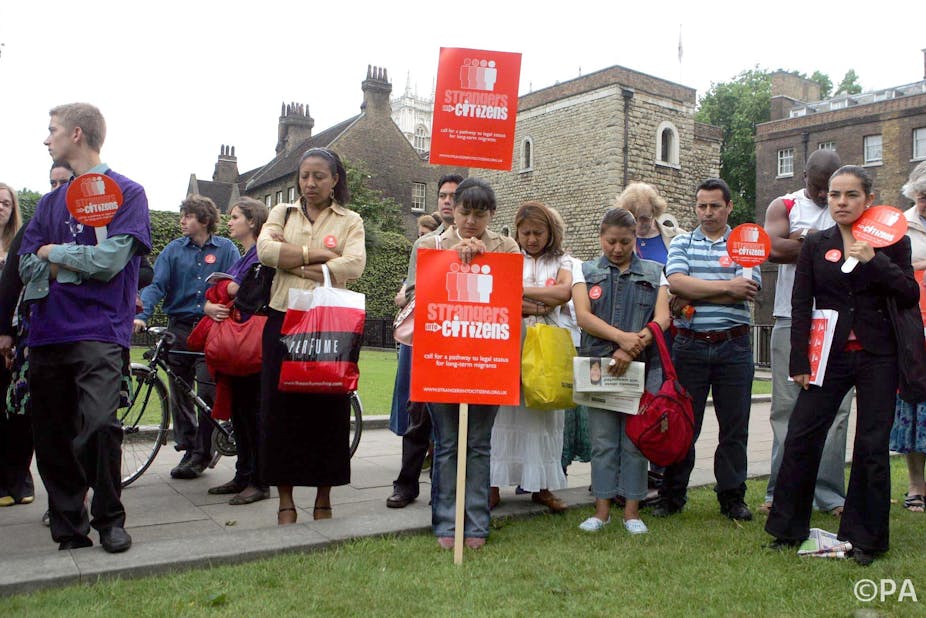If you listen to UKIP, you could be forgiven for thinking migrants are coming to Britain to access our foolishly generous welfare benefits and care nothing for integration.
But that’s simply not true. Exhaustive studies tell us that migrants want to work, they want to pay taxes and they want to learn English and make friends outside their community.
My recent research has shown refugees’ top priorities are speaking and writing English and accessing employment when reaching the UK.
Refugees use their relationships with friends and family to make connections outside their communities and get jobs. And we found that people who are connected to their own community are more likely to also develop networks outside them.
What matters most for refugees is being connected. And we found it doesn’t matter who they were connected with - whether it’s their immediate family, other refugees or wider society.
Of course, this contradicts much of the policy emphasis on links with “in-groups” being anti-integrative and it certainly flies in the face of those, who for political purposes, would have the British public believe only negatives about immigration.
There’s nothing new about this. Migrants arriving after the second world war were first vilified, next viewed as a threat to Britishness and then, when they elected to settle permanently in the UK, expected to assimilate into society without any support from the state.
As successive governments realised we had a growing and permanent ethnic minority population with an emerging voice, we gradually saw a move from an assimilationalist approach, where migrants were expected to abandon their language and traditions, to positive acceptance.
Some locales even celebrated multiculturalism, the retention of different cultures, and provided specialist welfare services and support for religious or ethnicity-based community organisations.
But since the early 1990s, the numbers and diversity of migrants arriving in the UK has risen. Politicians have been turning their back on multiculturalism and instead favouring an integrationist approach wherein migrants who are permitted to reside in the UK are expected to “develop British values”, to identify with British culture and of course to speak English.
Despite continued concerns about what might constitute “Britishness”, migrants wanting to access citizenship are meant to pass the Life in the UK test which asks a wide range of questions about British society. In the Queen’s speech last week more measures were announced to try to “ensure that this country attracts people who will contribute, and deter those who will not”. The implication is that migrants do not want to contribute or settle but are here, as David Cameron claimed back in 2011, to take advantage of our generous welfare state while being reluctant to learn English.
But again, as earlier research on English language classes (ESOL) has shown, while refugees wanted to attend ESOL and to improve their English so they could access employment, many were unable to access classes.
The research showed living with a partner and accessing family reunion were critical in helping refugees settle. Experiencing verbal or physical harassment had the opposite effect. This again reflects earlier research which showed that over a third of refugees experienced some kind of racist abuse and that such experiences left them fearful of mixing with people outside of their peer groups.
This rhetoric and the changes that will be proposed in the new Immigration Bill are undoubtedly an attempt to out-tough UKIP. Rather than use evidence to show that Britain’s fast-rising fourth party are scare-mongering, it is exaggerating - indeed, doing the impossible and predicting - the numbers of Bulgarians and Romanians likely to arrive in 2014, and perpetuating the myth that migrants are here to “scrounge”.
So what impact are the latest immigration measures likely to have on migrants’ ability integrate? Reinforcing UKIP’s anti-migrant message by stating “people could come here and expect something for nothing” implies the 3.5 million migrants who have arrived in the past decade contribute nothing.
Forcing private landlords and health practitioners to become de facto immigration authorities, and forcing migrants to constantly prove that they are in the UK legally, marks them out as a problem.
Such an approach legitimises anti-migrant feeling, making migrants feel excluded and more likely to be fearful of extending their social networks, while encouraging popular misconceptions of migrants as scroungers.
The failure of any political party to stress the positive contribution of the millions of migrants to the social and economic life of the UK or invest in decent ESOL classes, takes us back to the 1950s. We once again risk the institutional exclusion of migrants and provide conditions that foster similar or perhaps higher levels of inequality than experienced by the ethnic minority populations institutionally excluded half a century before.

